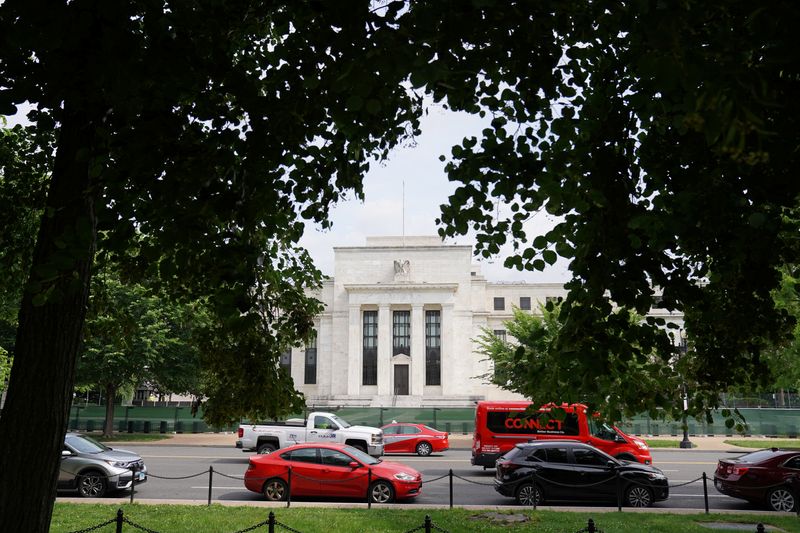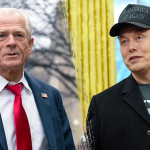
By Hari Kishan
BENGALURU (Reuters) – Global economic growth will maintain its robust pace next year as major central banks implement a series of interest rate cuts against the backdrop of a strong U.S. economy, according to a Reuters poll of around 500 economists.
Next week’s hotly-contested U.S. presidential election could limit the growth picture, however, by re-writing the current rules around trade.
Unexpected resilience that led economists to significantly upgrade their 2024 global growth forecasts since the beginning of the year is in large part thanks to the U.S. economy’s performance.
Inflation has also fallen sharply, with most major central banks now managing price pressures within striking distance or already at their respective targets.
Global growth was expected to average 3.1% this year, a steep upgrade from 2.6% in a January poll, also up from 2.9% in April and steady compared with a poll three months ago.
The world economy’s rate of expansion is expected to broadly hold up at 3.0% next year, according to a Reuters poll taken Sept. 30 – Oct. 30 covering 50 important economies.
While there were widespread fears earlier this year the U.S. economy would run into trouble from the effects of the highest interest rates in more than two decades, its resilience has consistently surprised economists and markets.
“I think there’s still a U.S. outperformance theme — certainly versus the euro zone and the UK,” said Ross Walker, head of global economics at Natwest Markets, looking ahead into next year.
Gross domestic product (GDP) growth in the world’s largest economy, last reported at 2.8% and driven by strong consumer spending, was expected to average 2.6% this year and 1.9% in 2025.
The U.S. economy has not only outpaced all of its G10 peers but also grew at nearly twice the rate economists had predicted at the start of the year. Its stock markets are trading near record highs, in part from money flowing in from abroad.
STRENGTH FROM ASIA
Other strong spots are India, the fastest-growing important world economy, as well as broad resilience in Asia.
Japan has had strong enough output recently to take small initial steps aiming at exiting decades of extraordinarily easy monetary policy.
Even Argentina’s beleaguered economy is set to rebound next year.
But policymakers managing No. 2 economy China are having to resort to aggressive monetary stimulus and an expected set of fiscal stimulus worth $1.4 trillion to meet Beijing’s 5% growth goal, a target already behind pre-pandemic performance.
For the bulk of world economies where rates are falling, those rates are more likely to go lower than forecast than higher, the survey found, further underpinning a solid global outlook.
A majority of respondents who answered a separate question, 147 of 255, said interest rates for the central banks they cover were more likely to end 2025 lower than forecast rather than surprise higher.
But in the U.S. a two-thirds majority, 33 of 40, said the federal funds rate was more likely to be higher, owing to continued strong economic performance and possible renewed inflation pressure.
“I look at the U.S. economy…at the macro data, the labour market, and of the major economic regions, it seems to me it is the one least in need of aggressive interest rate cuts,” added Natwest’s Walker.
U.S. ELECTION THE WILD CARD
If elected, Republican candidate Donald Trump plans to impose sweeping tariffs on imports from every country, which economists say carry serious downside risks.
“Republican proposed polices on tariffs – ranging from 10% baseline to targeted tariffs – should be taken seriously, in our view, given broad presidential discretion on trade policy,” noted economists at Morgan Stanley.
“In the U.S., broad tariffs imply downside risks to growth, through declines in consumption, investment spending, payrolls, and labor income. We estimate a delayed drag of -1.4% to real GDP growth, with headline PCE (personal consumption expenditures) prices rising 0.9% more rapidly.”
Among U.S. economists surveyed, an overwhelming majority, 39 of 42, said Trump’s policies would be more inflationary than those proposed by Democratic candidate Vice President Kamala Harris.
Both candidates are proposing economic policies that will drive up an already staggering U.S. fiscal deficit.
(Other stories from the Reuters global economic poll)
(Polling, analysis and reporting by the Reuters Polls team in Bengaluru and bureaus in Buenos Aires, Cairo, Istanbul, Johannesburg, London, Shanghai, and Tokyo; Editing by Ross Finley and Philippa Fletcher)






